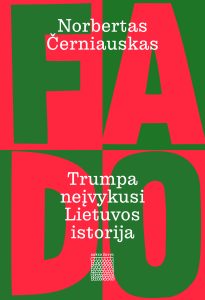Norbertas Černiauskas. FADO. A SHORT HISTORY OF LITHUANIA THAT NEVER HAPPENED

HISTORY AND BIOGRAPHY
Norbertas Černiauskas, Fado. A Short History of Lithuania That Never Happened (Fado. Trumpa neįvykusi Lietuvos istorija), Vilnius: Aukso žuvys, 2024, 224 pp.
Norbertas Černiauskas playfully, and with a pinch of irony, draws on existing sources as well as past visions and plans to tell us the history of Lithuania that never happened. He invites the reader to imagine what would have happened and how Lithuania would have looked if it had not been occupied by the Soviets in 1940 and later by the Nazis. If it had remained a free and independent country after the end of the Second World War. If it had been so in 1968, the year around which this book revolves. It has been chosen as the last frontier that the inter-war period’s projections, plans, and ideas for the future still reached. In an alternative version of Lithuanian history, the author presents this year, which is remembered in world history as one of rebellion and revolutions, through the pulse and transformations of daily and cultural life in Lithuania; the state’s political processes and economic progress; and the intersecting ideas of community and individualism. These three imaginary narratives are united by a common thread: Vilnius, Lithuania’s most important city, and by the parallel with Portugal, which is drawn both with the help of real historical facts (inter-war trade relations, and the visit of the Lithuanian diplomat Petras Klimas to the Portuguese President Óscar Carmona) and similarities between the two countries (a similar economic and social situation, and moderate authoritarianism).
Norbertas Černiauskas is a historian and lecturer at the University of Vilnius, co-author of several research publications. Published in June 2021, his study entitled “1940. Paskutinė Lietuvos vasara” (1940. Lithuania’s Last Summer) at once became a Lithuanian non-fiction best-seller and received the Book of the Year Award in the non-fiction and documentary category. It remains one of the most influential non-fiction books of the past decade.
Contact for rights: sigita@auksozuvys.lt